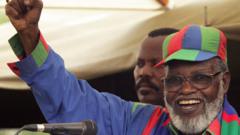Sam Nujoma, the father of Namibia's independence and a revolutionary leader, passed away at 95 after battling health issues. His legacy, marked by a fierce dedication to freedom and national unity, has shaped modern Namibia and earned him international accolades.
Sam Nujoma: Namibia's Founding Father and Revolutionary Leader Passes Away

Sam Nujoma: Namibia's Founding Father and Revolutionary Leader Passes Away
Sam Nujoma, the revered leader who guided Namibia to independence, dies at 95, leaving behind a profound legacy and a united nation.
In a poignant moment for Namibia, Sam Nujoma, the country’s founding father and its first president, has passed away at the age of 95. His death, confirmed by President Nangolo Mbumba, marks the end of an era for a nation that he profoundly influenced. Nujoma’s legacy as a revolutionary figure who led the fight against apartheid and colonial oppression is etched in the hearts of many Namibians.
Born in the village of Etunda, Nujoma rose from humble beginnings to become a symbol of freedom and resistance against colonial rule, which had plagued Namibia for decades. The historical backdrop of Namibian suffering at the hands of colonial powers, beginning with the German occupation in the early 20th century and succeeding South African rule, instilled in him a relentless resolve. He began actively campaigning for independence in the late 1950s, taking on the leadership role in the Owamboland Peoples Organization before finding refuge in exile.
While abroad, Nujoma spearheaded efforts to internationalize the struggle for independence, gathering support from countries and organizations committed to eradicating colonialism. This included seeking the United Nations’ intervention, although initial efforts were met with resistance from South Africa, which labeled him a "Marxist terrorist."
Nujoma’s guerrilla tactics and strategic collaborations with international allies, including Cuban troops, eventually turned the tides of the struggle. Namibia achieved independence in 1990, culminating in democratic elections where Nujoma was elected as the first president. His governance prioritized the rights of marginalized groups, particularly women and children.
Under his leadership, Namibia experienced a peaceful political transition, receiving recognition as a model for stability in Africa. Nujoma’s policies on national reconciliation aided in fostering unity among Namibia’s diverse ethnic groups and promoting coexistence despite a difficult past.
While Nujoma has been honored with widespread accolades, including the prestigious Lenin Peace Prize and the Indira Gandhi Peace Prize, his later years saw him maintaining a lower profile, choosing to focus on family life. He remained a towering figure behind the scenes, still exerting considerable influence on the political landscape.
As the nation mourns his passing, the legacy of Sam Nujoma endures, as he is remembered not only as a liberator but as a father figure to a nation, uniting diverse communities and steering Namibia towards the promising path of self-determination and progress.



















